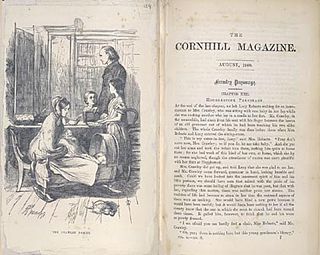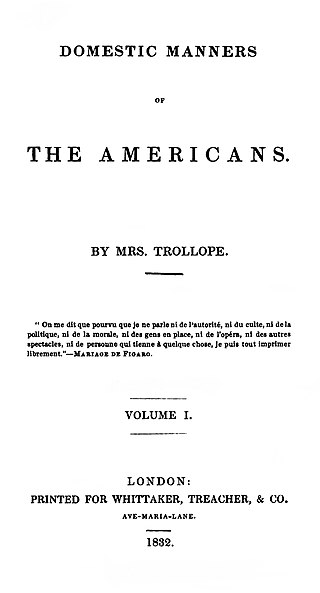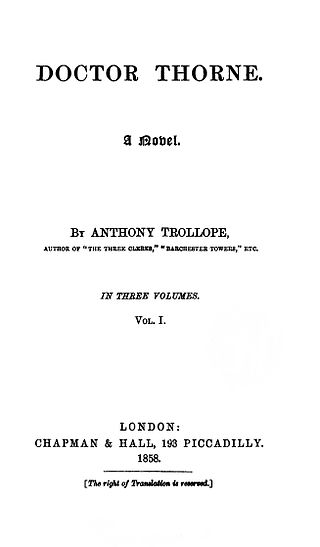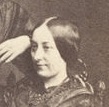
Anthony Trollope was an English novelist and civil servant of the Victorian era. Among his best-known works is a series of novels collectively known as the Chronicles of Barsetshire, which revolves around the imaginary county of Barsetshire. He also wrote novels on political, social, and gender issues, and other topical matters.

Barchester Towers is a novel by English author Anthony Trollope published by Longmans in 1857. It is the second book in the Chronicles of Barsetshire series, preceded by The Warden and followed by Doctor Thorne. Among other things it satirises the antipathy in the Church of England between High Church and Evangelical adherents. Trollope began writing this book in 1855. He wrote constantly and made himself a writing-desk so he could continue writing while travelling by train. "Pray know that when a man begins writing a book he never gives over", he wrote in a letter during this period. "The evil with which he is beset is as inveterate as drinking – as exciting as gambling".
The name Trollope is derived from the place-name Troughburn, in Northumberland, England, originally Trolhop, Norse for "troll valley". The earliest recorded use of the surname is John Andrew Trolope (1427–1461) who lived in Thornlaw, Co. Durham and Sir Andrew Trollope who was an English soldier during the later stages of the Hundred Years' War and at the time of the Wars of the Roses.
A vicar is a representative, deputy or substitute; anyone acting "in the person of" or agent for a superior. Linguistically, vicar is cognate with the English prefix "vice", similarly meaning "deputy". The title appears in a number of Christian ecclesiastical contexts, but also as an administrative title, or title modifier, in the Roman Empire. In addition, in the Holy Roman Empire, a local representative of the emperor, such as an archduke, could be styled "vicar".

Framley Parsonage is a novel by English author Anthony Trollope. It was first published in serial form in the Cornhill Magazine in 1860, then in book form in April 1861. It is the fourth book in the Chronicles of Barsetshire series, preceded by Doctor Thorne and followed by The Small House at Allington.

Spiritual warfare is the Christian concept of fighting against the work of preternatural evil forces. It is based on the biblical belief in evil spirits, or demons, that are said to intervene in human affairs in various ways. Although spiritual warfare is a prominent feature of neo-charismatic churches, various other Christian denominations and groups have also adopted practices rooted in the concepts of spiritual warfare, with Christian demonology often playing a key role in these practices and beliefs, or had older traditions of such a concept unrelated to the neo-charismatic movement, such as the exorcistic prayers of the Catholic Church and the various Eastern Orthodox churches.
Disestablishmentarianism is a movement to end the Church of England's status as an official church of the United Kingdom.
The Chronicles of Barsetshire is a series of six novels by English author Anthony Trollope, published between 1855 and 1867. They are set in the fictional English county of Barsetshire and its cathedral town of Barchester. The novels concern the dealings of the clergy and the gentry, and the political, amatory, and social manoeuvrings among them.

Frances Milton Trollope, also known as Fanny Trollope, was an English novelist who wrote as Mrs. Trollope or Mrs. Frances Trollope. Her book, Domestic Manners of the Americans (1832), observations from a trip to the United States, is the best known.

Domestic Manners of the Americans is a two-volume travel book by Frances Milton Trollope, published in 1832, which follows her travels through America and her residence in Cincinnati, at the time still a frontier town.
Churchmanship is a way of talking about and labelling different tendencies, parties, or schools of thought within the Church of England and the sister churches of the Anglican Communion.

Doctor Thorne is the third novel written by Anthony Trollope in his Chronicles of Barsetshire series, between Barchester Towers and Framley Parsonage. It was published by Chapman and Hall in London in 1858. The idea of the plot was suggested to Trollope by his brother Thomas. Though set in Barsetshire, Barchester and its familiar residents have little part in the proceedings. The novel is mainly concerned with money and position.

The English Cemetery in Florence, Italy is an Evangelical cemetery located at Piazzale Donatello. Although its origins date to its foundation in 1827 by the Swiss Evangelical Reformed Church, the name "English Cemetery" results from the majority of its burials being Protestants from the British and American communities of Florence, and who gave the largest sum of money for the purchase of its land. The cemetery also holds the bodies of non-English speaking expatriates who died in Florence, among them Swiss and Scandinavians, as well as Eastern Orthodox Christians, among them Russians and Greeks. The cemetery is still owned by the Swiss Evangelical Reformed Church, and is open for the interment of cremated ashes, now of all Christian denominations, but no longer for burials.

Thomas Adolphus Trollope was an English writer who was the author of more than 60 books. He lived most of his life in Italy creating a renowned villa in Florence with his first wife, Theodosia, and later another centre of British society in Rome with his second wife, the novelist Frances Eleanor Trollope. His mother, brother and both wives were known as writers. He was awarded the Order of Saints Maurice and Lazarus by Victor Emmanuel II of Italy.
The American Senator is a novel written in 1875 by Anthony Trollope. Although not one of Trollope's better-known works, it is notable for its depictions of rural English life and for its many detailed fox hunting scenes. In its anti-heroine, Arabella Trefoil, it presents a scathing but ultimately sympathetic portrayal of a woman who has abandoned virtually all scruples in her quest for a husband. Through the eponymous Senator, Trollope offers comments on the irrational aspects of English life.

The Claverings is a novel by Anthony Trollope, written in 1864 and published in 1866–67. It is the story of a young man starting out in life, who must find himself a profession and a wife; and of a young woman who makes a marriage of convenience and must accept the consequences of her decision.

Rachel Ray is an 1863 novel by Anthony Trollope. It recounts the story of a young woman who is forced to give up her fiancé because of baseless suspicions directed toward him by the members of her community, including her sister and the pastors of the two churches attended by her sister and mother.

The Vicar of Bullhampton is an 1870 novel by Anthony Trollope. It is made up of three intertwining subplots: the courtship of a young woman by two suitors; a feud between the titular Broad church vicar and a Low church nobleman, abetted by a Methodist minister; and the vicar's attempt to rehabilitate a young woman who has gone astray.

Frances Eleanor Trollope was an English novelist. She was best known for her biography on her mother-in-law, Frances Milton Trollope, who was famous for her book, Domestic Manners of the Americans, as well as her novels.

Miss Mackenzie is an 1865 novel by Anthony Trollope. It was written in 1864 and published by Chapman & Hall in February 1865. In his 1883 autobiography, Trollope stated that Miss Mackenzie "was written with the desire that a novel may be produced without any love; but even in this attempt it breaks down before the conclusion."














